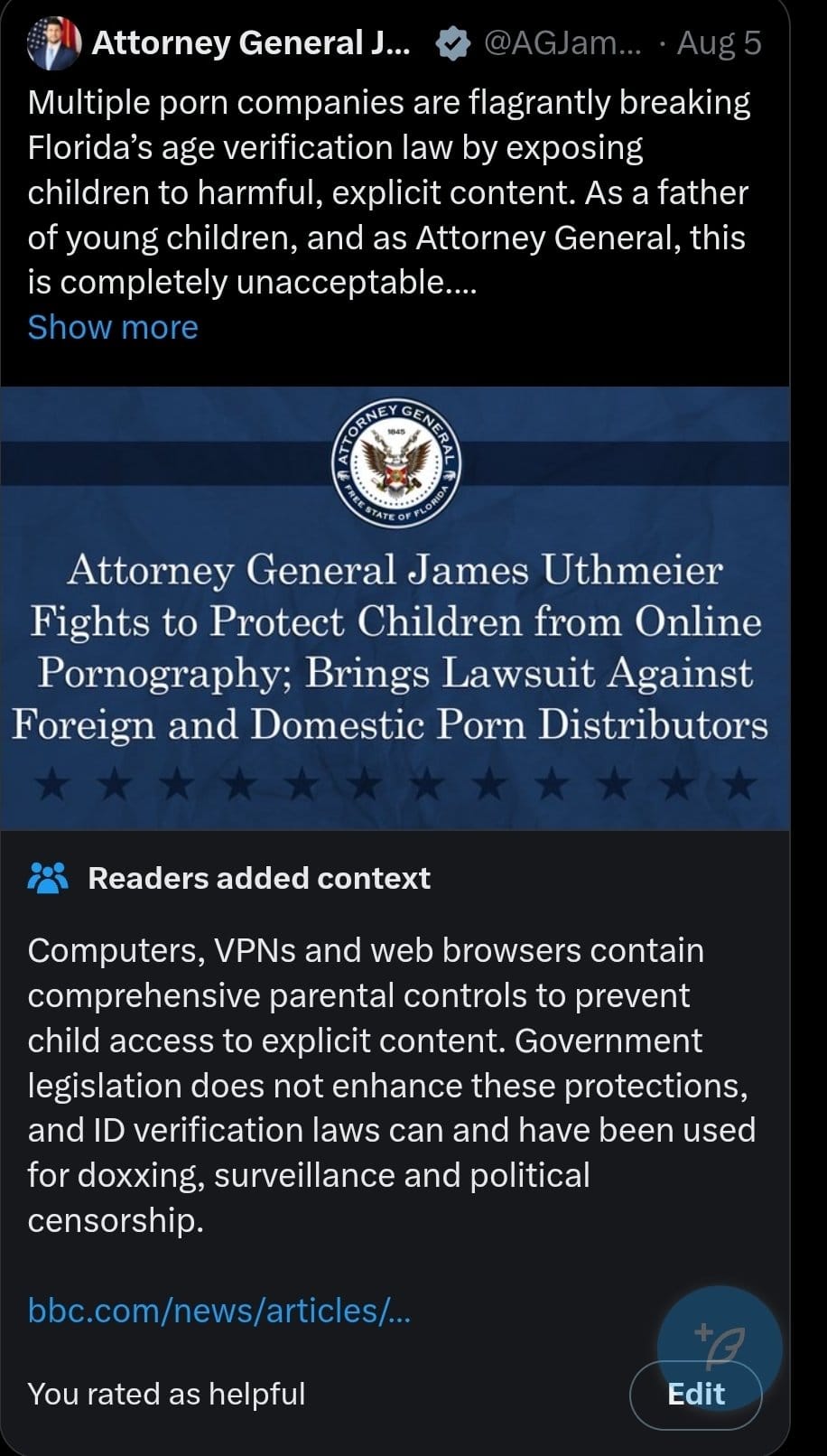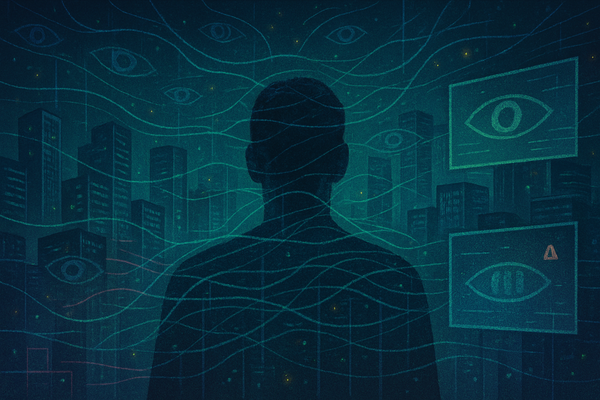The SCREEN Act: How "Protecting Children" Became the Trojan Horse for Mass Digital Surveillance

The Political Theater of Child Safety
On August 1, 2025, Representative Mary Miller's seemingly innocuous tweet about protecting children from adult content online sparked a firestorm that exposed the true nature of the SCREEN Act. Her statement—"Children should NEVER have access to adult content online"—was met with an unprecedented community note correction that garnered 7.8K comments, 2.2K retweets, and 9.4K likes, with over 3.2 million views. The overwhelming negative response revealed that Americans are beginning to understand the dangerous implications of this legislation.

The community note's correction was devastating in its simplicity: "This post implies that it is not currently possible to restrict children's access to the Internet. Parental controls are easy and available in almost any digital environment. It's the duty of parents to apply them." This single fact-check dismantled the entire premise of the SCREEN Act—that government intervention is necessary to protect children online when parents already have comprehensive tools at their disposal.

What Is the SCREEN Act?
The "Stopping Child Regressive Exploitation and Endangerment Network Act" (SCREEN Act) represents one of the most aggressive attempts to mandate identity verification for all internet users in American history. Despite its child-protection branding, the legislation would fundamentally transform the internet from an open platform into a gated, surveilled environment where anonymity is impossible.
Key Provisions of the SCREEN Act:
- Mandatory Age Verification: All websites with user-generated content must implement "robust" age verification systems
- Identity Documentation: Users must provide government-issued ID or biometric data to access large portions of the internet
- Data Retention Requirements: Platforms must store verification data for potential law enforcement access
- Liability Expansion: Websites face criminal liability if minors access "inappropriate" content
- Content Classification Mandates: Broad, vague definitions of what constitutes "harmful" content
- No Grandfather Clause: Existing accounts would require re-verification
The bill's language is deliberately vague about what constitutes "adult content," potentially encompassing everything from social media platforms to news websites, forums, and even e-commerce sites. This ambiguity isn't a bug—it's a feature designed to cast the widest possible surveillance net.

The Constitutional Crisis Hidden in Plain Sight
The SCREEN Act represents a direct assault on multiple constitutional protections:
First Amendment Violations
The Act creates a chilling effect on free speech by requiring identity verification for online expression. The Supreme Court has repeatedly held that anonymous speech is protected under the First Amendment, recognizing that identification requirements deter legitimate expression. As the Court noted in McIntyre v. Ohio Elections Commission, "Anonymity is a shield from the tyranny of the majority."
Fourth Amendment Concerns
By mandating collection and retention of identity documents, the SCREEN Act creates a massive surveillance database without probable cause or warrants. Every website visit, every comment, every interaction would be tied to a verified identity, creating comprehensive profiles of Americans' online activities.
Fifth Amendment Issues
The Act's vague definitions of "harmful" content and severe penalties create due process violations. Website operators cannot know in advance what content might trigger liability, forcing them to over-censor to avoid prosecution.
The Technical Impossibility of "Protecting Children"
The SCREEN Act's proponents ignore fundamental technical realities:
Existing Parental Controls Work
Every major operating system, browser, internet service provider, and platform already offers comprehensive parental controls:
- Device-level restrictions (iOS Screen Time, Android Family Link)
- Router-level filtering (OpenDNS, Circle Home Plus)
- Browser controls (SafeSearch, supervised accounts)
- Platform-specific tools (YouTube Kids, Netflix Kids profiles)
- Third-party solutions (Bark, Qustodio, Net Nanny)
Parents who claim they cannot protect their children online are either unaware of these tools or unwilling to use them. The SCREEN Act's solution—surveilling everyone—is like requiring all citizens to wear ankle monitors because some parents won't supervise their children.
Age Verification Cannot Be Accurate Without Identity Verification
There are only three ways to verify age online:
- Self-declaration: Easily bypassed by lying
- Credit card verification: Excludes adults without credit cards and can be bypassed with prepaid cards
- Government ID/biometric verification: Destroys anonymity and creates surveillance infrastructure
The SCREEN Act explicitly requires the third option, revealing its true purpose: not protecting children, but eliminating online anonymity.
Global Internet Makes Enforcement Impossible
The internet is global. Even if every U.S. website implements age verification, users can simply:
- Use foreign websites
- Employ VPNs to appear to be from other countries
- Access content through proxy services
- Use alternative protocols and platforms
The only way to make the SCREEN Act effective would be to implement China-style internet controls with a Great Firewall—exactly where this legislation leads.
The Real Agenda: Total Information Awareness
The SCREEN Act isn't about protecting children—it's about implementing a comprehensive digital surveillance system. Consider who benefits:
Law Enforcement and Intelligence Agencies
- Real-time tracking of all online activities
- Elimination of anonymous whistleblowing
- Complete social graphs of all citizens
- Predictive policing based on online behavior
Data Brokers and Advertisers
- Verified identity data worth billions
- Perfect tracking across all platforms
- Elimination of ad blockers and privacy tools
- Behavioral profiles tied to real names
Authoritarian Politicians
- Identification of political dissidents
- Tracking of protest organization
- Monitoring of opposition messaging
- Suppression of anonymous criticism
Foreign Adversaries
- Massive databases ripe for hacking
- Blackmail material on millions of Americans
- Intelligence gathering on citizens
- Identification of vulnerable targets
The Bipartisan Deception
While Representative Miller is a Republican, the SCREEN Act enjoys concerning bipartisan support. Democrats frame it as protecting children from exploitation, while Republicans present it as defending traditional values. This bipartisan consensus reveals a troubling truth: both parties are willing to sacrifice digital privacy for political gain.
The community note on Miller's tweet exposed this deception. Users across the political spectrum recognized that the SCREEN Act isn't about protecting children—it's about controlling adults. The 3.2 million views and overwhelmingly negative response show that Americans are waking up to this reality.
The International Context: A Coordinated Attack
The SCREEN Act isn't occurring in isolation. It's part of a coordinated international push for digital identity verification:
- UK: Online Safety Act requiring age verification
- EU: Digital Services Act and proposed Chat Control
- Australia: Social media age verification laws
- Canada: Online Streaming Act and Online News Act
This simultaneous global push reveals coordination at the highest levels. The same talking points—"protecting children," "online safety," "preventing harm"—appear in legislation worldwide. The same companies—AU10TIX, Yoti, Jumio—provide verification services globally. The same outcome—total surveillance—emerges everywhere.
The Slippery Slope Is Real
History shows that surveillance powers, once granted, always expand:
The PATRIOT Act Pattern
- 2001: Temporary measures to fight terrorism
- 2025: Permanent surveillance of all Americans
Social Security Numbers
- 1936: Not to be used for identification
- 2025: Required for every transaction
Driver's Licenses
- Early 1900s: Only for driving
- 2025: De facto national ID
The SCREEN Act follows this pattern. Today it's "protecting children from porn." Tomorrow it's "preventing extremism." Next week it's "stopping misinformation." The infrastructure, once built, will be used for every purpose except the one originally stated.
The Corporate Collaboration
Tech companies publicly oppose the SCREEN Act while quietly preparing to profit from it:
The Verification Industrial Complex
Companies like AU10TIX, Yoti, and Jumio stand to make billions from mandatory verification. They're lobbying for the SCREEN Act while claiming to protect privacy. These companies have troubling connections to intelligence agencies and foreign governments.

Platform Monopolization
Large platforms can afford compliance costs; smaller competitors cannot. The SCREEN Act would cement the dominance of Big Tech while claiming to regulate it. This regulatory capture disguised as consumer protection is a hallmark of modern corporatism.
Data Broker Bonanza
Verified identity data is the holy grail for data brokers. The SCREEN Act would create the largest verified database in history, worth hundreds of billions to companies that profit from surveillance.

What Happens When SCREEN Passes
If the SCREEN Act becomes law, expect:
Immediate Effects
- Mass deletion of online accounts
- Exodus to foreign platforms
- Underground internet expansion
- Identity theft explosion
- Massive data breaches
Medium-term Consequences
- Small website shutdowns
- Internet balkanization
- VPN criminalization
- Expansion to all online services
- Social credit scoring
Long-term Dystopia
- Complete online surveillance
- Elimination of dissent
- Predictive prosecution
- Digital caste system
- American Great Firewall
The Resistance Strategy
The community note on Representative Miller's tweet shows that resistance is possible. Here's how to fight back:
Political Action
- Contact your representatives: Make it clear that supporting SCREEN means losing your vote
- Support primary challengers: Replace politicians who support digital surveillance
- Organize locally: Build grassroots opposition in your community
- Educate others: Share information about SCREEN's true purpose
Technical Resistance
- Use privacy tools now: VPNs, Tor, encrypted messaging
- Support alternative platforms: Decentralized, privacy-respecting services
- Learn operational security: Protect your identity before it's too late
- Build parallel systems: Create networks outside surveillance infrastructure
Legal Challenges
- Support litigation: Donate to organizations challenging SCREEN
- Document harm: Collect evidence of surveillance abuse
- Demand transparency: File FOIA requests about verification systems
- Assert rights: Refuse to comply with unconstitutional demands
The Historical Moment
We stand at a crossroads. The SCREEN Act represents the final push to eliminate online anonymity and implement total digital surveillance. The overwhelming negative response to Representative Miller's tweet shows that Americans understand the stakes.
The question isn't whether the SCREEN Act is about protecting children—it obviously isn't, as the community note proved. The question is whether Americans will allow politicians to use children as human shields for digital tyranny.
Conclusion: The Mask Has Slipped
Representative Miller's failed attempt to promote the SCREEN Act revealed the growing awareness among Americans that "child safety" has become the universal excuse for surveillance. The community note's viral spread—reaching 3.2 million views—demonstrates that citizens are no longer falling for this manipulation.
The SCREEN Act isn't about protecting children. Parents already have comprehensive tools to manage their children's online activities. This legislation is about surveilling adults, eliminating anonymity, and creating a digital panopticon where every click, comment, and connection is monitored and recorded.
The choice is clear: we can accept the SCREEN Act and surrender our digital privacy forever, or we can resist now while resistance is still possible. The community has spoken with its response to Representative Miller—Americans reject digital surveillance disguised as child protection.
The battle over the SCREEN Act isn't just about internet freedom—it's about the future of human liberty in the digital age. If we allow governments to require identity verification for online access, we're not protecting children; we're imprisoning everyone in a digital surveillance state from which there is no escape.
The overwhelming rejection of Representative Miller's propaganda shows that Americans are ready to fight for their digital rights. The question now is whether that awareness will translate into action before it's too late. The SCREEN Act must be stopped—not for our sake, but for the sake of the very children its proponents claim to protect, who deserve to inherit an internet that enables freedom rather than enforcing surveillance.








